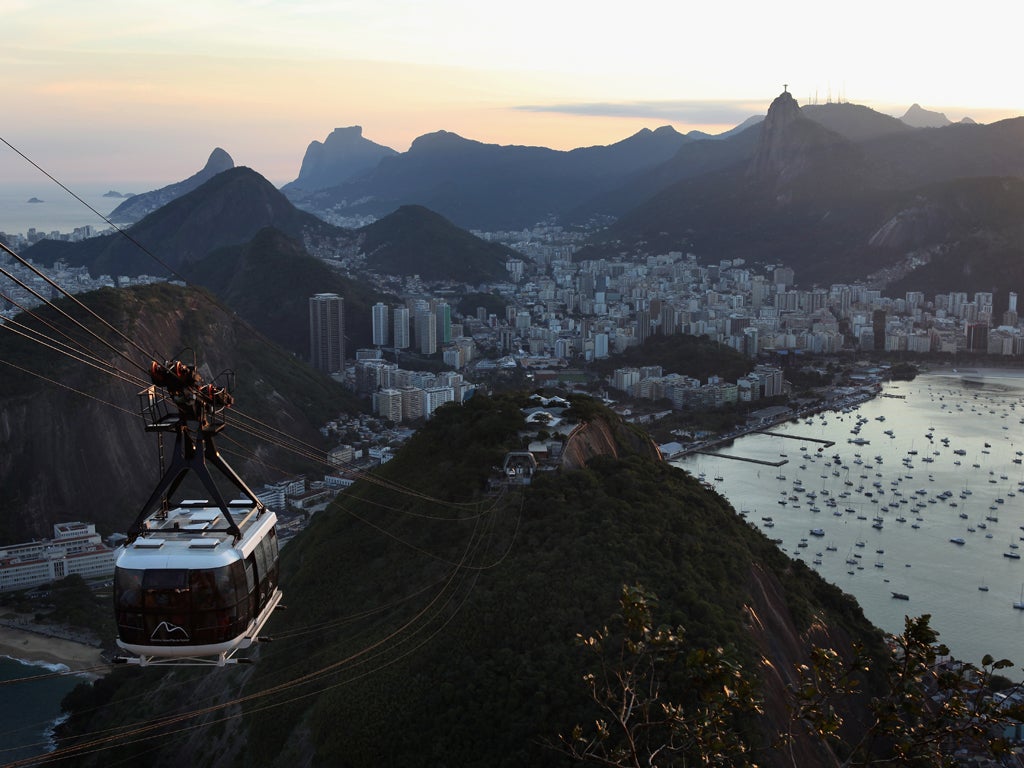Travelling World Cup fans to face rabies, hepatitis and drugs wars
The 2014 draw takes the England team to dangerous Brazilian cities, but the real trial will be reaching them


England football fans travelling to Brazil for the World Cup face an alarming range of dangers in the three host cities for the group stages next June. The team’s opponents – Italy, Uruguay and Costa Rica – look challenging enough, but the venues themselves are daunting.
The first game against Italy will take place in the hot, steamy heart of the Amazon in Manaus on Saturday 14 June, (2am Sunday UK time). The NHS issues stern warnings about the range of threats to British travellers, including diphtheria, rabies and hepatitis. It also gives a specific caution about malaria in Manaus.
Attention then shifts to Sao Paulo for the match with Uruguay on 19 June. According to Western diplomats, it is the most dangerous city in Brazil. The US State Department warns that: “All areas of Greater Sao Paulo have a high rate of armed robbery of pedestrians and drivers at stoplights and during rush hour traffic”.
It also draws particular attention to “incarcerated drug lords” whose efforts to “exert their power outside of their jail cells have resulted in sporadic disruptions in the city, violence directed at the authorities, bus burnings, and vandalism at ATM machines, including the use of explosives”. Meanwhile the official Australian travel advice says: “Some armed groups in Sao Paulo have begun robbing patrons in restaurants”.
By comparison, the final group match against Costa Rica in Belo Horizonte on 24 June looks reasonably risk-free. But the logistics of travelling around South America’s largest nation, and finding accommodation, could prove a nightmare.
Those desperate to be in Brazil for the World Cup watched travel prices soar and availability evaporate within minutes of the draw for the group stages yesterday. As each of the 32 nations was picked out in turn, its supporters could identify the dates and venues of the three opening matches – and begin to search online for flights and hotels.
The resulting surge of bookings produced perhaps the biggest spike the travel industry has ever seen. The heaviest demand was from the large European nations – England, Germany, France, Italy and Spain – and from the South American contingent, in particular Argentina, Chile and Colombia.
The Independent made test bookings for a range of flights and hotels just ahead of the draw, and checked prices once the fixtures for the first 48 games in the tournament were confirmed. On TAP Portugal – the only European airline serving Manaus – fares rose 15 per cent in an hour. Flying down to Rio – the team’s full-time base for however long they stay in the World Cup – from London Heathrow on British Airways is selling at £2,070.
Normally, intense rivalry between the airlines of the major Continental European qualifiers – France, Holland, Germany, Spain and Italy – keeps a lid on fares to South America. But home-country demand means far fewer seats are available for connecting passengers from England. The next issue facing fans is transport between the venues.
England fans face a journey of nearly 2,000 miles between Manaus and Sao Paulo. Domestic air fares started the day at reasonable levels, such as £119 for the two-and-a-half hour flight between Sao Paulo and Salvador, but more than doubled after the draw.
The Brazilian government has said it may allow airlines from elsewhere in South America to operate domestic flights, but a decision will be made only when the dust has settled. The alternative form of transport is the bus network – which also saves on accommodation – but the journey between Manaus and Sao Paulo is scheduled to take more than two days.
Finding hotel rooms could prove frustrating and expensive. Many hotels in the host cities have frozen availability for the duration of the tournament, while they take stock of likely demand.
Sao Paulo is likely to present the biggest challenge for accommodation. Although Brazil’s largest city has many thousands of hotel beds, England’s opponents are Uruguay – for whom the venue is merely a long-ish drive from Montevideo. Fans who are simply wanting to soak up the carnival atmosphere could do well to choose the final game in Group F, in which Bosnia take on Iran. Neither team is expected to be in contention to progress.
Millions of tickets have been sold, and the next tranche goes on sale on Sunday. Individual football associations, including England, will be given an allocation for their fans – but only eight per cent, which means barely 3,000 tickets for the opening England match. Already the touts are active, with prices of £1,000 or more.
Simon Calder is the Independent's Travel Correspondent
Join our commenting forum
Join thought-provoking conversations, follow other Independent readers and see their replies
Comments
Bookmark popover
Removed from bookmarks